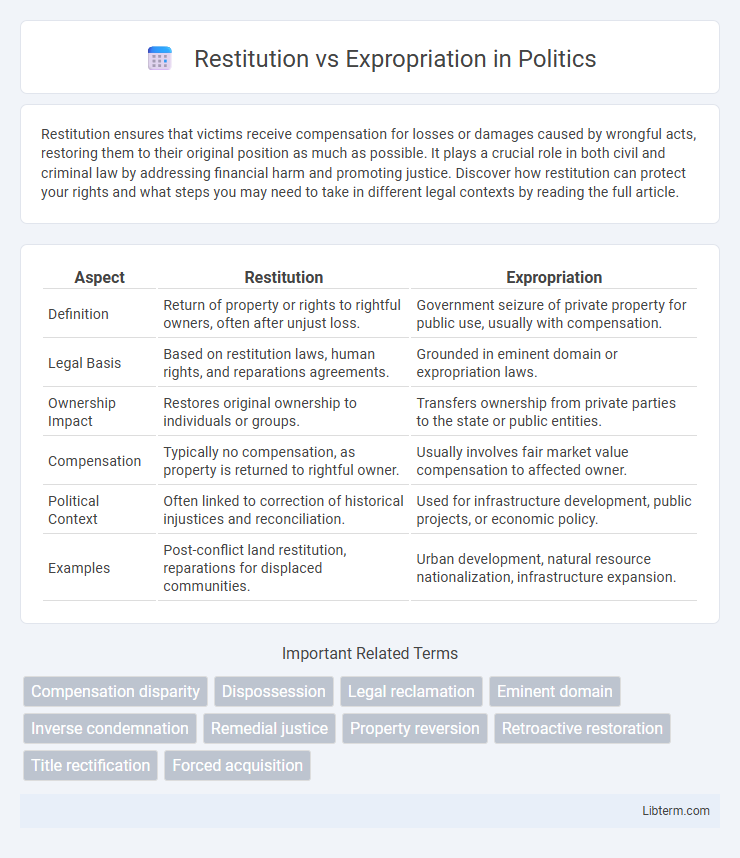Restitution ensures that victims receive compensation for losses or damages caused by wrongful acts, restoring them to their original position as much as possible. It plays a crucial role in both civil and criminal law by addressing financial harm and promoting justice. Discover how restitution can protect your rights and what steps you may need to take in different legal contexts by reading the full article.
Table of Comparison
| Aspect | Restitution | Expropriation |
|---|---|---|
| Definition | Return of property or rights to rightful owners, often after unjust loss. | Government seizure of private property for public use, usually with compensation. |
| Legal Basis | Based on restitution laws, human rights, and reparations agreements. | Grounded in eminent domain or expropriation laws. |
| Ownership Impact | Restores original ownership to individuals or groups. | Transfers ownership from private parties to the state or public entities. |
| Compensation | Typically no compensation, as property is returned to rightful owner. | Usually involves fair market value compensation to affected owner. |
| Political Context | Often linked to correction of historical injustices and reconciliation. | Used for infrastructure development, public projects, or economic policy. |
| Examples | Post-conflict land restitution, reparations for displaced communities. | Urban development, natural resource nationalization, infrastructure expansion. |
Understanding Restitution: Definition and Principles
Restitution involves restoring property or its value to the rightful owner after wrongful loss or deprivation, emphasizing fairness and legal recognition of ownership rights. It is based on principles such as undoing unjust enrichment and remedying harm caused by illegal actions or breaches of contract. Understanding restitution requires distinguishing it from expropriation, which typically involves governmental seizure for public use with compensation under sovereign authority.
What is Expropriation? Key Concepts Explained
Expropriation refers to the state's legal authority to seize private property for public use, typically with compensation paid to the owner. Key concepts include eminent domain, where government entities take land or assets deemed necessary for infrastructure, public services, or economic development projects. Unlike restitution, which aims to restore property or rights to previous owners, expropriation legally transfers ownership from private parties to the state under established laws and compensation frameworks.
Legal Foundations of Restitution and Expropriation
The legal foundations of restitution are grounded in principles of unjust enrichment and property rights, mandating the return or compensation of assets wrongfully taken or withheld. Expropriation is legally justified under sovereign authority, often requiring due process and public interest criteria, where the state compulsorily acquires private property with compensation. Both legal frameworks emphasize the balance between individual property rights and government power, guided by international law standards such as the Hague Conventions and human rights treaties.
Historical Context: Restitution vs. Expropriation
Restitution involves returning property or compensation to individuals or groups wrongfully deprived, often linked to post-conflict recovery and legal redress for historical injustices such as slavery or land dispossession. Expropriation refers to the state's seizure of private property for public use, frequently justified under eminent domain but historically associated with colonial and authoritarian regimes reallocating land and resources. The historical context reveals restitution as a corrective measure seeking justice, while expropriation often reflects power dynamics and governmental authority over private ownership.
Comparing Goals: Justice, Compensation, and Public Interest
Restitution aims to restore property or rights to their original owners as a form of justice, emphasizing fair compensation for losses incurred, whereas expropriation involves the state taking property for public interest, often with compensation that may not fully reflect market value. Justice in restitution prioritizes correcting historical wrongs and re-establishing ownership, while expropriation balances individual rights against societal needs such as infrastructure or development projects. Compensation in restitution aligns closely with the restoration goal, whereas in expropriation it serves to mitigate the impact on owners but supports broader public policy objectives.
Advantages and Drawbacks of Restitution
Restitution offers the advantage of restoring property or rights directly to the original owner, promoting justice and preserving historical ownership without lengthy compensation disputes. However, restitution can be complex and costly, often involving difficulties in identifying rightful owners and valuing or physically returning assets. Drawbacks also include potential disruptions to current occupants or users and administrative burdens on legal or governmental systems managing the process.
Pros and Cons of Expropriation
Expropriation allows governments to reclaim private property for public use, providing benefits such as infrastructure development and economic growth. However, it poses significant risks including potential violations of property rights, inadequate compensation, and negative impacts on investor confidence. Balancing public interest with fair compensation remains a critical challenge in expropriation cases.
International Case Studies: Restitution and Expropriation in Practice
International case studies demonstrate the complex application of restitution and expropriation in practice, highlighting the divergent legal and political frameworks guiding each process. The landmark case of Loewen Group v. United States exemplifies challenges in expropriation claims under NAFTA, while the restitution of properties post-Apartheid in South Africa showcases efforts in remedial justice through property return. These examples reveal how tribunals balance state sovereignty against investor rights, influencing the global discourse on property restitution and expropriation.
Human Rights Implications: Balancing Fairness and Development
Restitution restores property rights to individuals or communities wrongfully deprived, reinforcing human rights principles of justice and redress. Expropriation, often used for public development, raises concerns about adequate compensation, due process, and potential displacement, challenging the balance between collective progress and individual rights. Ensuring transparent legal frameworks and fair compensation mechanisms is crucial to uphold human dignity while supporting sustainable development goals.
Navigating the Future: Policy Recommendations and Best Practices
Navigating the future of restitution and expropriation requires clear policy frameworks that balance property rights with public interest, ensuring fair compensation mechanisms and transparent legal processes. Best practices emphasize stakeholder engagement, international legal compliance, and robust dispute resolution systems to mitigate conflicts and promote equitable outcomes. Governments should implement adaptive policies that address historical injustices while fostering economic development and social cohesion.
Restitution Infographic

 libterm.com
libterm.com